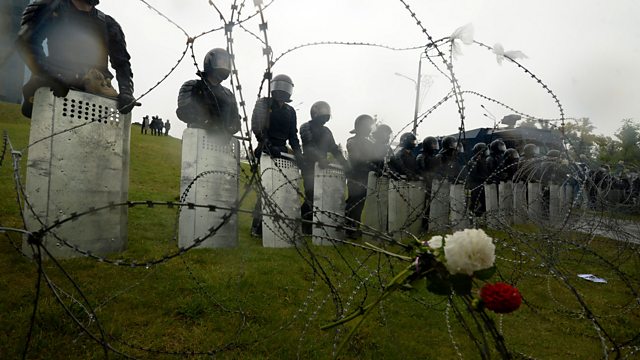The price of dissent in Belarus
Activists on trial in Minsk; Nigeria's security threats unnerve its elite; Australia back in lockdown; race in Singapore; wonders (and terrors) of nature in Costa Rica.
The repressive tactics of the Belarusian state have been back in the news this week β and all over the map. The Olympic Games in Tokyo were shaken by sprinter Krystina Timonovskayaβs row with her coaches β she ended up seeking asylum in Poland. In Ukraine, the head of a group helping Belarusian emigres was found hanged in a park in Kyiv; his death is still being investigated. In Belarus itself, itβs nearly a year since the disputed election of August 2020 - which sparked mass protests over the result. Since then the government of Aleksandr Lukashenko has been going after people who were involved in the demonstrations with every means to hand. This week, one of the main βfacesβ of the protests went on trial. Sarah Rainsford was in Minsk and has been speaking to family and friends of Maria Kolesnikova.
In Nigeria, the mass abduction of children has become a tragically recurring kind of news story: eighty taken in one incident, over 120 in another β just in the past few months. But itβs not just crime which is destabilising Nigeria right now. There is the continuing insurgency of the jihadist group Boko Haram in the north, and a crop of separatist movements around the country. As Mayeni Jones reports, the insecurity is now touching even people whoβd previously managed to shield themselves from the worst:
It sounds like the stuff of a military dictatorship: troops will be out on the streets, enforcing a curfew, with people forbidden to leave their homes except on essential business. But this is Sydney, Australia - where yet another lockdown has been enforced, in in an effort to halt a surge in Covid cases. Different parts of this vast country have adopted their own rules β but one thing all parts of Australia share is a reverence for the traditional character of the βlarrikinβ β a rebellious, anti-establishment type who doesnβt take kindly to rules or regulations of any sort. So, Phil Mercer asks, how has a larrikin-loving nation reacted to such draconian measures?
The city-state of Singapore is officially a multi-racial, multi-faith nation with a strong ethos of unity across ethnic or religious lines. Nearly three-quarters of its people are of Chinese descent, just over a tenth are Malay, and Indians make up just under a tenth. As the country gears up to celebrate its National Day, thereβs a lot of rhetoric about equal rights and a single purpose. But some people from minority groups feel discrimination and prejudice are widespread. Sharanjit Leyl explores the public's attitudes.
Costa Rica gets a lot of good press for its efforts to preserve nature. Itβs got an extraordinary array of micro-climates and species, and it's a leading voice in international efforts to tackle climate change. So it's also a hotspot for nature tourists β from bird spotters to those who want to wander into a real live rainforest. But not everything about Costa Ricaβs government is green β and not all its life forms are friendly. Michelle Jana Chan went for a night walk which shed light on all sorts of wondersβ¦ and horrors.
Producer: Polly Hope
Last on
More episodes
Previous
Broadcast
- Sat 7 Aug 2021 11:30ΒιΆΉΤΌΕΔ Radio 4 FM

